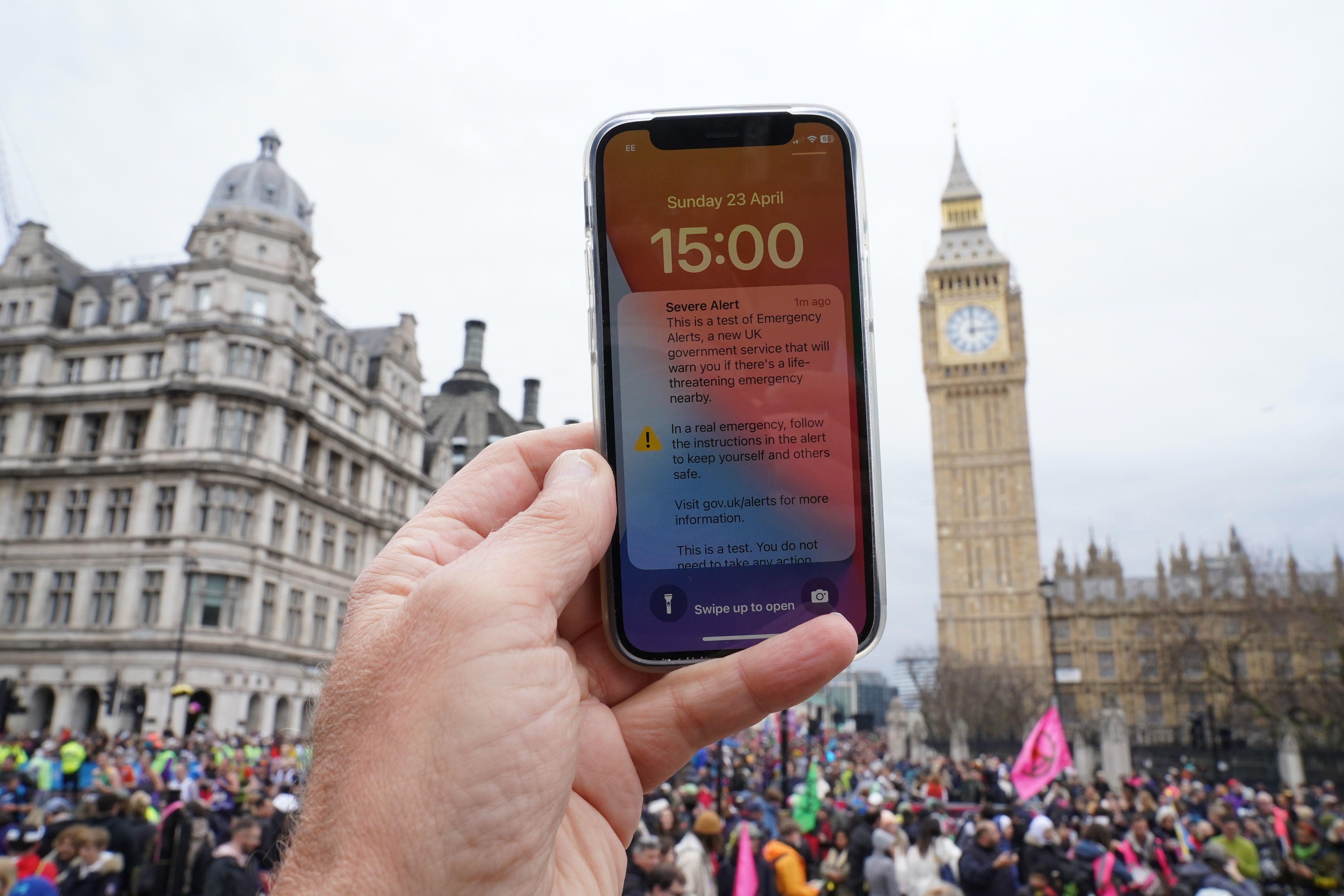Emergency alert goes off minute early for some - and not at all for others
Mobile phones across the UK will emit a warning siren and vibrate for up to 10 seconds during the test
Your support helps us to tell the story
From reproductive rights to climate change to Big Tech, The Independent is on the ground when the story is developing. Whether it's investigating the financials of Elon Musk's pro-Trump PAC or producing our latest documentary, 'The A Word', which shines a light on the American women fighting for reproductive rights, we know how important it is to parse out the facts from the messaging.
At such a critical moment in US history, we need reporters on the ground. Your donation allows us to keep sending journalists to speak to both sides of the story.
The Independent is trusted by Americans across the entire political spectrum. And unlike many other quality news outlets, we choose not to lock Americans out of our reporting and analysis with paywalls. We believe quality journalism should be available to everyone, paid for by those who can afford it.
Your support makes all the difference.The emergency alert test on Sunday appears not to have gone entirely smoothly, with some phone users receiving the message early and others not at all.
Millions of mobile phones across the UK were set to emit a loud alarm and vibrate in a nationwide test of a new public alert system, at 3pm.
Britons have taken to social media to complain that they didn’t receive the alert with some saying members of their household received the siren but they did not.
“Well that was disappointing, no #emergencyalert on mine or my husbands phone and yes we do have them turned on,” one Twitter user said.
Another added: “No alert on my pixel 6 pro, though I'm seeing I'm not the only one. And nothing on my Nans old iPhone either even though it's on iOS 12. Slightly odd!”
There were also widespread reports on social media of people receiving the alert at 2.59pm instead of 3pm.
On the other hand, some phone users were underwhelmed by the alert.
John Eldon tweeted: “Was that it? It sounded like they were going to announce tuppence off cabbages in Lidl. Well, that's going by the sound my husband's phone made - mine didn't go off at all."
James McInerney added: “3pm test at 14:59” with a laughing emoji.
Donna tweeted: “Was that it!!!!!”

Wez wrote: “Well the govt alert system was a big fail, my phone worked but other family members didn’t… just the confidence you need in a life or death situation.”
The system is intended to be used in life-threatening situations including flooding and wildfires but some Britons have now raised concerns that the alerts would not be a success given a large proportion of people did not receive it.
The message was sent to 4G and 5G mobile phones, with sound and vibration for up to 10 seconds.
Phone users were prompted to acknowledge the alert by swiping or clicking the message before being able to continue using their device.

The test on St George’s Day coincided with major events including the London Marathon and the 2pm kick-off Premier League ties between Bournemouth and West Ham and Newcastle and Tottenham Hotspur.
Officials said they worked with the Football Association and the Marathon’s organisers to make sure the impact of the test will be limited.
National Fire Chiefs Council chairman Mark Hardingham said: “For 10 seconds the national test may be inconvenient for some, but please forgive us for the intrusion because, the next time you hear, it your life, and the life-saving actions of our emergency services, could depend on it.”
The system is modelled on similar schemes in the US, Canada, the Netherlands and Japan.
Chancellor of the Duchy of LancasterOliver Dowden said: “Getting this system operational with the national test means we have another tool in our toolkit to keep the public safe in life-threatening emergencies.
“It could be the sound that saves your life.”
People who did not wish to receive the alerts will be able to opt out in their device settings, but officials hope the life-saving potential of the messages means that users will keep them on.
More follows on this breaking story....






Join our commenting forum
Join thought-provoking conversations, follow other Independent readers and see their replies
Comments